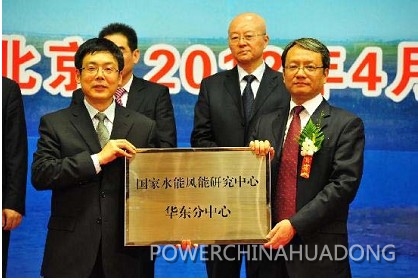Promoting Sustainability through Engineering
Energy · Cities · Environment
April 13, 2012, Beijing, the National Energy Administration held the plaque unveiling ceremony for the National Water Energy and Wind Energy Research Center and the Center was officially established in HYDROCHINA CORPORATION. The plaque unveiling ceremonies for the branch centers of the Center took place on the same day. Mr. Zhang Chunsheng, president of HYDROCHINA HUADONG, and Mr. Wu Guanye, chief engineer of HYDROCHINA HUADONG, attended the ceremony. Zhang Chunsheng, on behalf of the company, received the plaque for Huadong Branch of National Water Energy and Wind Energy Research Center.
As an open research platform, the National Water Energy and Wind Energy Research Center is established to make strategies and policies, spur development and research of science and technology, education and training of personnel as well as international exchange in the development of water energy and wind energy in China so as to provide policy guidelines and technical support for the management of the aforesaid field. There are 5 subordinate institutes directly under the Center, namely, the Strategy and Policy Institute, the Engineering Technology Institute, the Reservoir Economy Institute, the Environmental Protection Institute, and the Information Technology and Management Institute. The Center has 7 branch centers, namely, Beijing Branch Center, Xibei (northwest) Branch Center, Zhongnan (Mid-south) Branch Center, Huadong (East China) Branch Center, Chengdu Branch Center, Guiyang Branch Center and Kunming Branch Center. At present, the National Water Energy and Wind Energy Research Center has worked out its plan from 2012 to 2015 and the focal points for the work in 2012 which cover the following topics: the research on the orderly development of water energy and wind energy, the research on the development of local economy and society spurred by development of hydroelectric projects, the research on the administration mechanism of hydropower construction, the research on the resettlement of the affected rural population, the research on the relationship between the development of hydroelectric projects and the protection of ecological environment, and the research on the electric power market and the mechanism shaping the electricity rate etc.
